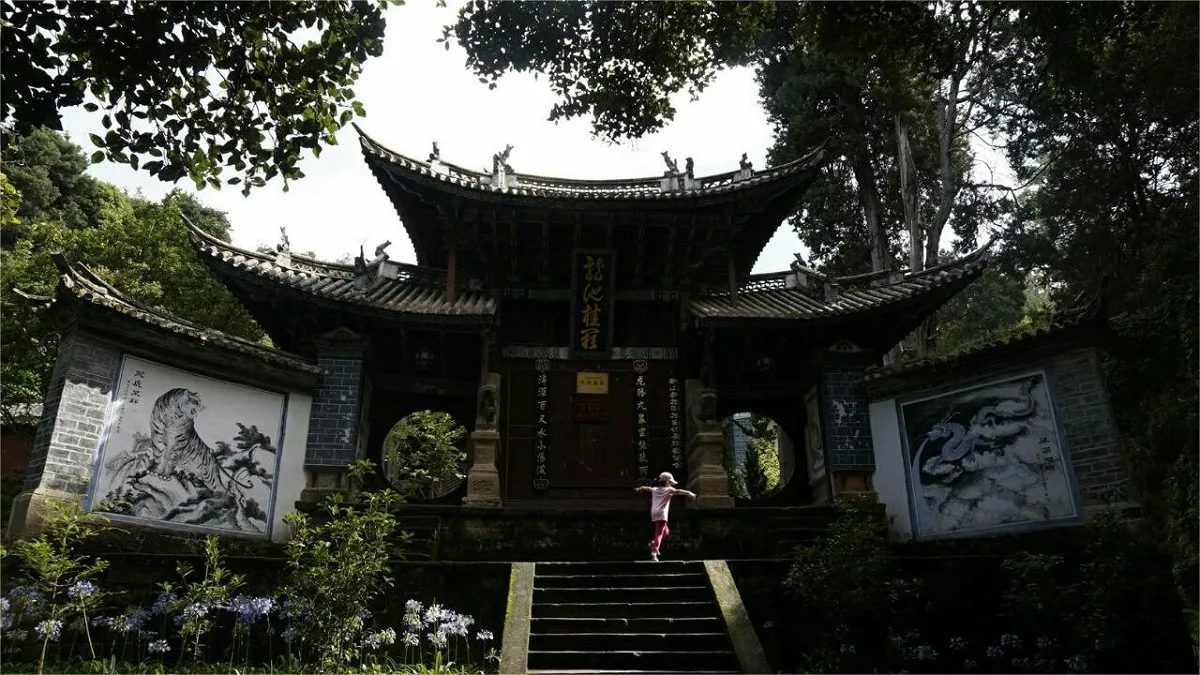Located in Dali, Yunnan Province, Weibao Mountain (巍宝山) spans an area of 19.4 square kilometers, with its summit towering at an altitude of 2509 meters. The mountain extends majestically from the northeast to the southwest. It is renowned as the birthplace of the Nanzhao Kingdom, with Daoist temples constructed since the Tang Dynasty and flourishing during the Ming and Qing Dynasties. By the end of the Qing Dynasty, Daoist temples dotted the entire mountain, making it one of the four famous Daoist mountains in China.
Weibao Mountain features the spectacular Bird Migration Pass, showcasing the remarkable phenomenon of bird migration. It also houses mosques with diverse architectural styles of the Hui ethnic minority and serves as a natural reserve for Yunnan peacocks. Additionally, it was once a sacred site for the Yi ethnic people to worship their ancestors, where grand temple fairs still is held annually from the first day to the fifteenth day of the second lunar month.
Apart from numerous Daoist temples, Weibao Mountain also hosts several Buddhist temples such as the Guanyin Hall and the Ganlu Pavilion. Throughout history, Buddhism and Daoism have coexisted and competed here, influencing and integrating with each other.
Table of Contents
- Basic Information
- Location and Transportation
- Map of Weibao Mountain
- Highlights of Weibao Mountain
- Vlog about Weibao Mountain
Basic Information
| Estimated Length of Tour | 1 day |
| Ticket Price | 40 RMB |
| Opening Hours | 8.00 – 18.00; Last admission: 17.30 |
| Telephone Number | 0086-0872-6308166 |
Location and Transportation
Located within the territory of Weishan Yi and Hui Autonomous County in Dali Bai Autonomous Prefecture, Yunnan Province, Weibao Mountain is situated approximately 10 kilometers southeast of the county town, close to Weishan Old Town. To reach there, you can take a bus from Xiaguan in Dali to Weishan County town first, then transfer to a minibus heading to Weibao Mountain. The bus fare typically ranges from 12 to 16 yuan.
Map of Weibao Mountain

Highlights of Weibao Mountain
Tuzhu Temple

Tuzhu Temple, also known as Xunshan Temple, venerates Xineruo, the first king of the Nanzhao Kingdom. Flanked by attendants dressed in traditional Yi ethnic attire, Xineruo is revered as the Earth Master by the local Yi community. Villagers from nearby areas gather here twice annually for the Tubu Festival. On the 14th day of the ninth lunar month, believed to be Xineruo’s birthday, and the 15th day of the first lunar month, families burn the spirit tablets of deceased relatives, ensuring their souls return to the ancestral temple. Besides solemn rituals, the Tubu Festival features vibrant song and dance performances.
Wenchang Palace

Wenchang Palace serves as the focal point for visitors to Weibao Mountain. Its imposing gateway, known as the mountain gate, stands between the main hall and the second hall, overlooking a clear spring pond named “Dragon Pool.” Historically, locals worshipped the Dragon King here, hence the alternative name Dragon Pool Hall. During the Qing Dynasty, the temple was converted into a Daoist sanctuary, with the main hall dedicated to the God of Literature and the second hall to the God of War, hence the name Wenchang Palace. Adjacent to the pond is the hexagonal pavilion known as Wulong Pavilion, accessible via arched bridges on either side. Adorning the western face of the pavilion is a mural dating back to the 24th year of the Qianlong Emperor’s reign (1795 AD). The mural, approximately 1.2 meters in length, depicts a scene of 40 people dancing and 34 people forming a circle, with three individuals dancing and playing musical instruments in the center, while three others play instruments and fan themselves on the outside, adding to the festivity.
Jade Emperor Pavilion

The Jade Emperor Pavilion, centrally located on Weibao Mountain, showcases the grandeur of the Daoist pantheon. Built in the 22nd year of the Kangxi Emperor’s reign (1688 AD), the mountain gate serves as the Lingguan Hall, housing Daoist guardian spirits. Beyond the gate, the pavilion’s layered roofs soar majestically, with successive courtyards nestled against the mountainside: the Four Generals Hall, Celestial Master Hall, Three Officials Hall, Lüzu Hall, Jade Emperor Pavilion, and Yunyi Pavilion. Inside, deities such as the Three Officials of Heaven, Earth, and Water, as well as Lüzu, the God of Wealth, and the Kitchen God, are worshipped. Annually, from the first to the fifteenth day of the second lunar month, Jade Emperor Pavilion hosts a Dongjing Ceremony, featuring ancient melodies and lively festivities.


